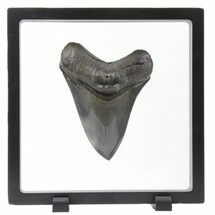This Specimen has been sold.
Serrated, .6" Dromaeosaurid Theropod (Acheroraptor) Tooth - Montana
This is a .6" long dromaeosaurid theropod (Acheroraptor temertyorum) tooth from the Hell Creek Formation in Montana. It shows the distinct ridges of an Acheroraptor tooth and beautifully preserved serrations along the distal edge. Comes in an acrylic display case.
The enamel along one face of the tooth is weathered.
The enamel along one face of the tooth is weathered.
About Acheroraptor
Acheroraptor temertyorum was described in 2013 from upper and lower jaw bones containing teeth. The teeth have been known for decades, but no diagnostic material had been recovered. Acheroraptor lived in the Cretaceous period 67-66 million years ago and were relatively large for a raptors. They resembled Asian velociraptors more closely than other North American Dromaeosaurs.
Smaller theropods like Acheraptor typically did not use their teeth for killing, so their teeth are much smaller in size in relation to their skulls when compared to larger theropods that used their teeth as the primary killing tool.
Acheroraptor teeth are like tiny, slightly curved daggers with rounded serrations, with larger posterior serrations than anterior. The most distinguishing features are their apicobasal ridges, running from the base of the tooth to the apex.
Many of the raptor teeth found in the Hell Creek Formation show morphological differences often attributed to taxa from other formations of different ages. Among those are Saurornitholestes, Richardoestesia gilmorei, Richardoestesia isosceles, and Paronychodon. Remains of all of these species are fragmentary and some known only from teeth: there is no evidence they lived in the Hell Creek Formation.
A 2013 study found that Acheroraptor was the only dromaeosaurid from the Hell Creek Formation and concluded that dromaeosaurid teeth formerly attributed to other taxa should be identified as Acheroraptor. Any other identification is not supported scientifically until associated skeletal remains are found to indicate otherwise.
Acheroraptor temertyorum was described in 2013 from upper and lower jaw bones containing teeth. The teeth have been known for decades, but no diagnostic material had been recovered. Acheroraptor lived in the Cretaceous period 67-66 million years ago and were relatively large for a raptors. They resembled Asian velociraptors more closely than other North American Dromaeosaurs.
Smaller theropods like Acheraptor typically did not use their teeth for killing, so their teeth are much smaller in size in relation to their skulls when compared to larger theropods that used their teeth as the primary killing tool.
Acheroraptor teeth are like tiny, slightly curved daggers with rounded serrations, with larger posterior serrations than anterior. The most distinguishing features are their apicobasal ridges, running from the base of the tooth to the apex.
Many of the raptor teeth found in the Hell Creek Formation show morphological differences often attributed to taxa from other formations of different ages. Among those are Saurornitholestes, Richardoestesia gilmorei, Richardoestesia isosceles, and Paronychodon. Remains of all of these species are fragmentary and some known only from teeth: there is no evidence they lived in the Hell Creek Formation.
A 2013 study found that Acheroraptor was the only dromaeosaurid from the Hell Creek Formation and concluded that dromaeosaurid teeth formerly attributed to other taxa should be identified as Acheroraptor. Any other identification is not supported scientifically until associated skeletal remains are found to indicate otherwise.
Because of its age and sedimentary composition, the Hell Creek Formation has become one of the most paleontologically studied areas in the world. 158 genera of animals and 64 genera of plants are known from the formation and new discoveries are made frequently. In addition to Tyrannosaurs, Ceratopsids, and Hadrosaurs, the formation has yielded remains of amphibians, reptiles, lizards, snakes and turtles, fish and sharks, avian and non-avian dinosaurs, and mammals. The Hell Creek Formation gives the most complete understanding of the environment just before the Cretaceous-Paleogene extinction.
SPECIES
Acheroraptor temertyorum
LOCATION
Private Ranch, Eastern Montana
FORMATION
Hell Creek Formation
SIZE
.6" long (straightline)
CATEGORY
SUB CATEGORY
ITEM
#204042
We guarantee the authenticity of all of our specimens.
 Reviews
Reviews












